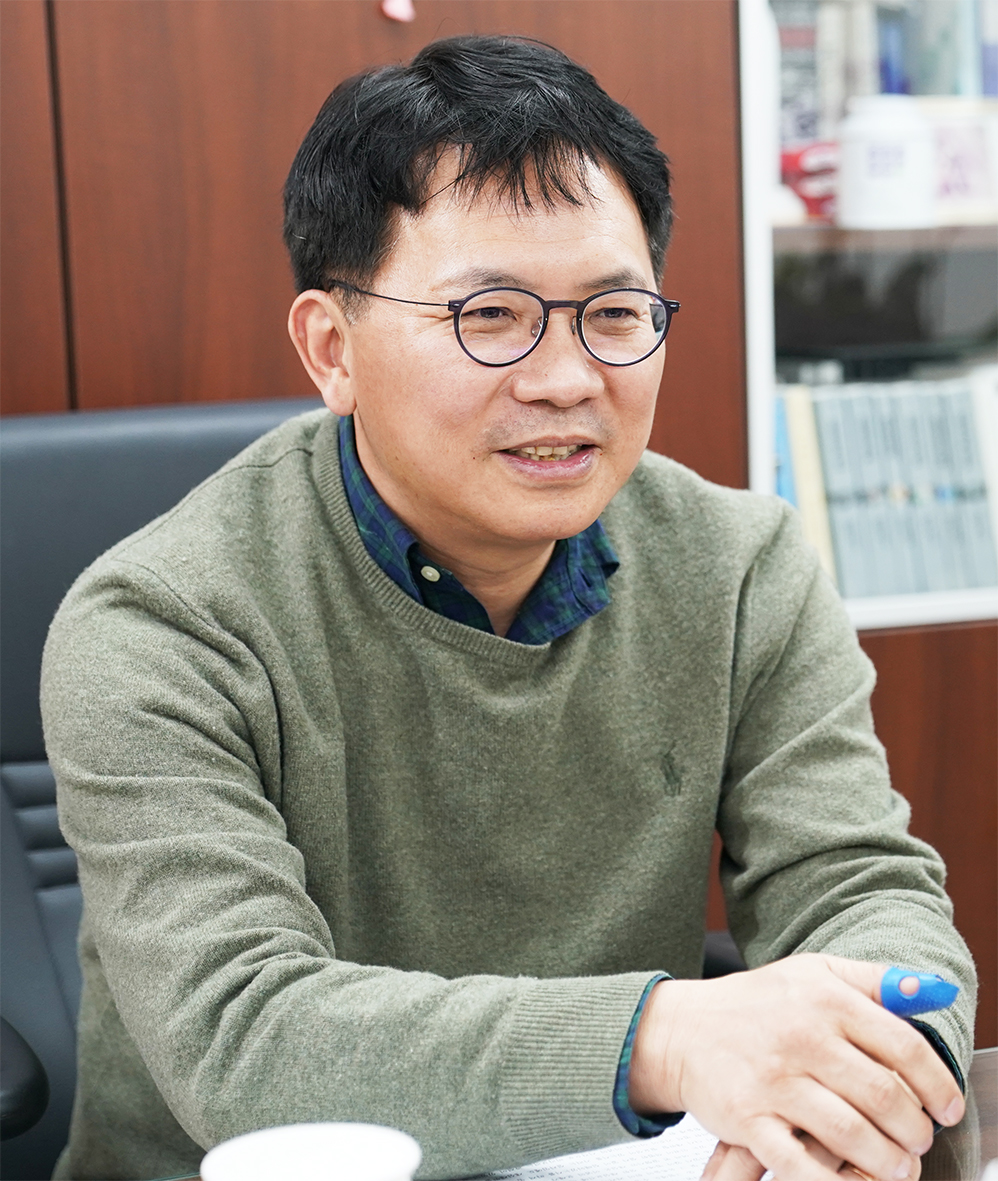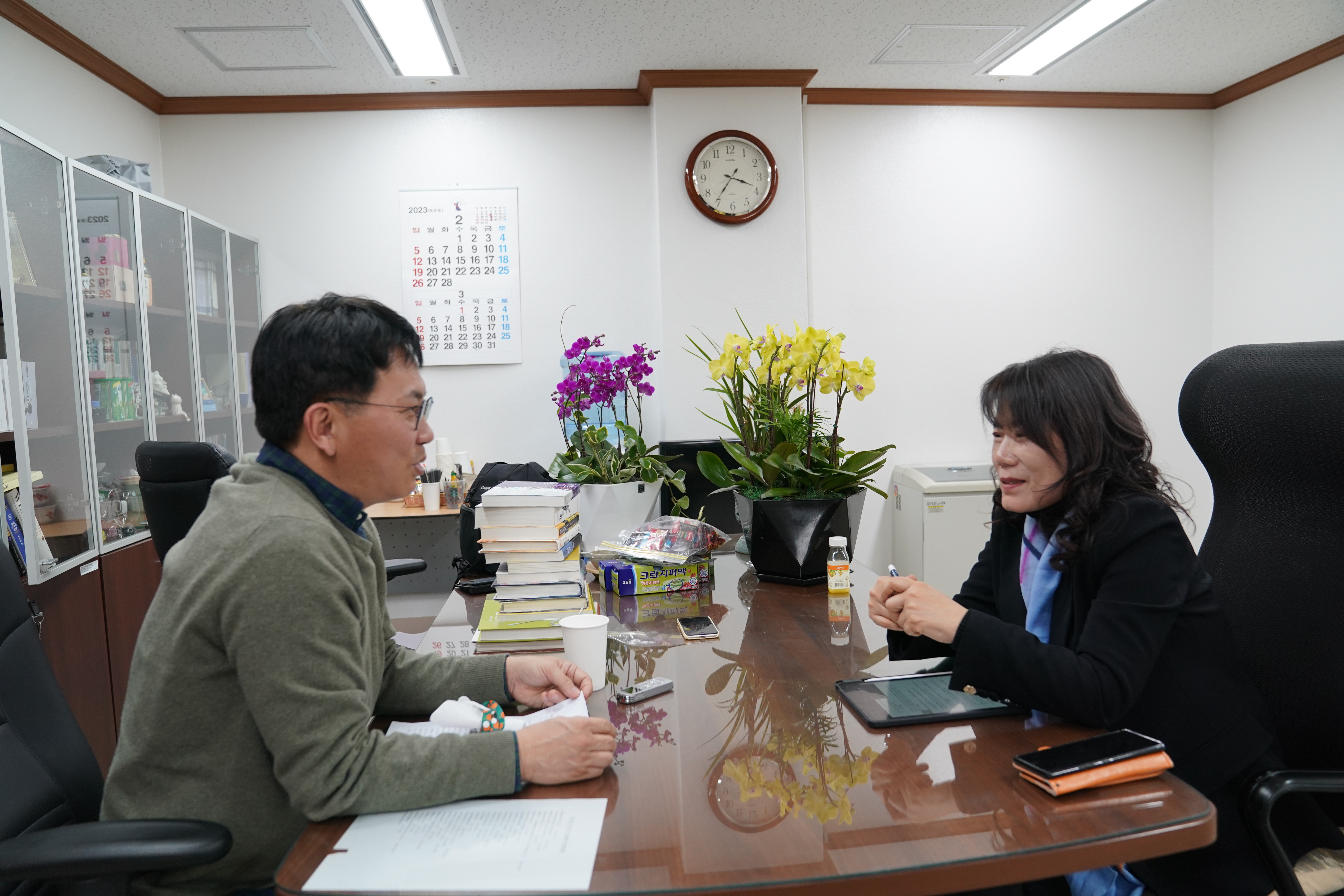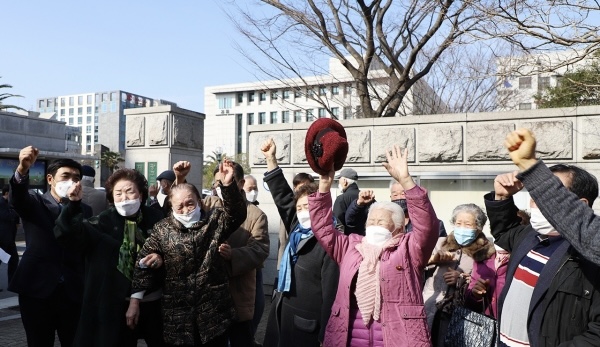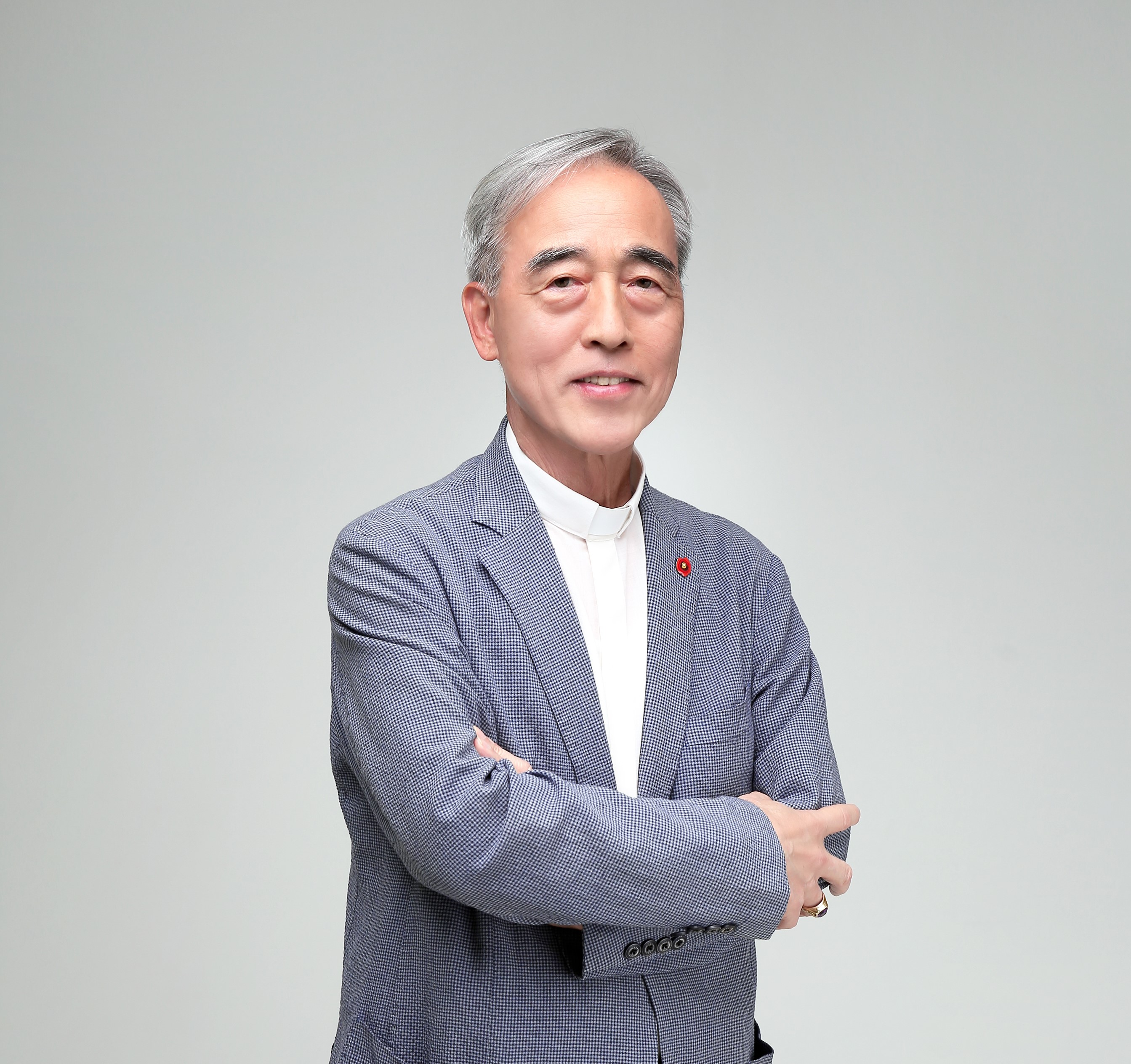Jeju 4·3: Intergenerational Transmission of Memories and Tasks for Just Resolution, Special Roundtable Talk with College Students
Special Feature
Jeju 4·3: Intergenerational Transmission of Memories and Tasks for Just Resolution
Special Roundtable Talk with College Students
Marking the 75th anniversary of Jeju 4·3 and the publication of Vol. 50 of its bulletin “Jeju 4·3 and Peace,” the Jeju 4·3 Peace Foundation invited local undergraduates for a special roundtable talk under the theme of “Jeju 4·3: Intergenerational Transmission of Memories and Tasks for Just Resolution.”
Attendees included Park Ju-yeong, president of the Student Union at Jeju National University (JNU), Kim Hyeon-ji, president of the Student Union at Jeju International University, Kim Seong-ryoon, president of the Student Union at JNU College of Ocean Science, Ko Joon-hyeok, leader of JNU’s Jeju 4·3 Club “Jeju 4·3 Camellia Trail”, and Han Su-rim, head of the PR team of “Camellia Supporters” at the Jeju 4·3 Peace Foundation. On the 75th anniversary of Jeju 4·3, the students discussed the remaining tasks for the just resolution of Jeju 4·3 and the implications of its intergenerational transmission.
 Editor’s Note: (Conference Room of Jeju 4·3 Peace Memorial, Feb. 9, 2023)
Editor’s Note: (Conference Room of Jeju 4·3 Peace Memorial, Feb. 9, 2023)
Moderated by Jang Yoon-shik, head of Memorial Project Team, Jeju 4·3 Peace Foundation
Transcribed by Yang Na-woon, staff member of Memorial Project Team, Jeju 4·3 Peace Foundation
Photographed by Kim Yeong-mo, staff member of General Affairs Team, Jeju 4·3 Peace Foundation
 ++ Kim Seong-ryoon
++ Kim Seong-ryoon

++ Han Su-rim

++ Ko Joon-hyeok

++ Park Ju-yeong

++ Kim Hyeon-ji

++ Moderated by Jang Yoon-shik, head of Memorial Project Team, Jeju 4·3 Peace Foundation
Jang Yoon-shik: Thank you for joining us today. As we have invited college students, we’ve chosen the intergenerational transmission of Jeju 4·3 as the theme of this meeting. I believe that each of you has a vital role to play in it. First of all, a move to establish a postgraduate program for Jeju 4·3 studies at JNU has begun. Shall we talk about the initiative and implications?
Ko Joon-hyeok: I find it very inspiring that a memorandum of understanding has been signed to establish and operate a postgraduate program on Jeju 4·3 studies within JNU for the education of specialized researchers and the creation of a systematic academic foundation in the field. However, I think that students should have more opportunities to learn about Jeju 4·3 in earlier education. Only when the step-by-step approach continues will we be able to make the most of the planned postgraduate program on Jeju studies.
Kim Hyeon-ji: I totally agree. We need to ensure a systematic and continuous course on Jeju 4·3 throughout the curriculum in elementary, middle, and high schools. If students fail to be well-educated on Jeju 4·3 in primary and secondary courses, they will be unlikely to be interested in it in college. Since 2020, Jeju 4·3 has been added to the nation’s middle and high school curricula for history classes. I expect that by gaining impetus from this move, a postgraduate course will be opened to grant master’s and doctoral degrees on Jeju 4·3 studies and help foster researchers more actively.
Han Su-rim: That’s a good point. In fact, there has been a constant demand for a program to train specialists with expertise in Jeju 4·3, but we have had only some elective courses at the university level. Now, the provincial government, the provincial council, and the JDC will jointly provide a budget for professional education courses, while JNU will operate postgraduate courses as well as research and training programs. I feel so glad that there is finally a green light for the arrangement of academic foundations for uncovering the truth of Jeju 4·3 and exonerating the victims.
Park Ju-yeong: I think that the initiative should also take the practical elements into consideration. First, we need to prioritize general education on Jeju 4·3 by running a mandatory liberal arts class prior to the master’s or doctoral program. Second, conflicts may occur due to different perspectives on Jeju 4·3, so we should be very careful in terms of selecting educators. Third, we need to ensure career opportunities or sustainable research opportunities after completion of the postgraduate program so as to stabilize the course and further encourage relevant research.
Kim Seong-ryoon: To lay the groundwork for public awareness of Jeju 4·3 at national and international levels, it is essential to establish a postgraduate program on Jeju 4·3 studies. Broadened research will help navigate the path to discovering the truth of Jeju 4·3 and giving a right name to it.
Kim Hyeon-ji: My university doesn’t even have a class on Jeju 4·3. Therefore, I’m planning to propose opening courses about Jeju 4·3. I’ll also try to work together with other universities in the Jeju region to engage them in diverse projects or events hosted by the Jeju 4·3 Peace Foundation and to continue to raise awareness of Jeju 4·3.
Jang Yoon-shik: I believe that student leaders and clubs have significant roles to play to draw students’ attention to educational and promotional programs about Jeju 4·3 on campus.
Kim Seong-ryoon: As the leader of the Student Union of the College of Ocean Science at JNU, I’ve always thought about how we can imprint the significance of Jeju 4·3 in the minds of our schoolmates. In Gwangju, for example, the May 18 Foundation and local college students have been holding the 5·18 Red Festa. They operate food stands and arrange plays and singing and dancing performances through which young students can reinterpret and reproduce the significance of the Gwangju Democratization Movement. This year, the members of our student union have also been making efforts to prepare a participatory event, rather than a unilateral one based on learning by rote, where participants can contemplate Jeju 4·3 together.
Han Su-rim: Last year, I joined the Camellia Supporters at the Jeju 4·3 Peace Foundation and participated in different PR activities. We updated card news [a Korean news format for social media that visualizes major issues at a glance using images and short sentences] and video postings on Instagram and set up a promotional booth, “When Camellia Flowers Bloom,” during the JNU Festival. I felt proud because people showed more interest in Jeju 4·3 than I expected. It would be great if there is also an educational program for the Camellia Supporters. It will help the supporters to share even greater responsibility for their roles, without simply engaging in the PR activities. And, most of the promotional events are concentrated in April, evolving around the Jeju 4·3 memorial day. If these events are more evenly distributed throughout the year, we’ll be able to ensure continuity in the PR activities.
Park Ju-yeong: JNU took the initiative in the movement to uncover the truth of Jeju 4·3, which makes me feel increased responsibility. My schoolmates and I will build solidarity with other universities for the intergenerational transmission of Jeju 4·3 memories. In the same context, we newly opened the Jeju 4·3 Solidarity Team within the JNU Student Union. I believe that we all need to build an organic solidarity for the resolution of Jeju 4·3. We’re planning to promote the Jeju 4·3 Grand March in collaboration with the Jeju 4·3 Peace Foundation and actively work with other universities nationwide to carry out campaigns to raise public awareness of Jeju 4·3.
Jang Yoon-shik: There are remaining tasks for the resolution of Jeju 4·3. One of them is to give it a right name. This topic may be difficult, but I’d like you to share your thoughts with others.
Ko Joon-hyeok: I heard some students ask if it is really necessary to properly define what happened 75 years ago. However, I believe that we need to accurately perceive the history of Jeju 4·3 and clearly define its historical characteristics. To this end, we should have accurate knowledge of the circumstances at the time, that is, what happened around and after the nation’s liberation from Japanese colonial rule. Dividing the period of Jeju 4·3 based on proximity in time from liberation, earlier Jeju 4·3 featured a resistance against oppression by force, while the subsequent period could be classified as a period of massacre where countless civilians were killed. I want to call it “Jeju 4·3 Resistance” to signify that Jeju residents aspired to build a unified, independent nation, and that they took the initiative in that regard during Jeju 4·3.
Kim Seong-ryoon: In my opinion, we need to distinguish armed clashes between the armed guerillas and the counterinsurgency forces from the massacre of innocent civilians. I would like to define what happened on and after April 3, 1948, as the “South Korea Labor Party Disturbance,” given that it was an ideological conflict between the Jeju members of the South Korea Labor Party and the US Army Military Government in Korea. As for the events that occurred after Song Yo-chan, the 9th Regiment Commander, issued a proclamation on Oct. 17, 1948, I’d like to call them the “Jeju Massacre.” In giving a right name to Jeju 4·3, we commonly wish to exonerate the victims. This is why it is important to find the right name for Jeju 4·3 based on established facts.
Han Su-rim: Jeju 4·3 didn’t happen instantly but was prolonged over seven years. During these seven years, there occurred massacres, resistance, and counterinsurgency operations. It is deemed very difficult to describe this whole series of events with one term. Therefore, I think we need a new term that can better explain Jeju 4·3.
Jang Yoon-shik: Listening to your different opinions, I realized that we still need more research and discussion on what would be the right name of Jeju 4·3. We also have another task of clarifying the responsibility of the United States in Jeju 4·3. Mr. Park, could you share your thoughts?
Park Ju-yeong: Revealing the responsibility of the U.S. must be completed without fail, however long it takes. I think it was a significant move to hold the symposium with the theme of “Jeju 4·3, Human Rights, and ROK-U.S. Alliance” recently in Washington DC. The U.S. Army Military Government had branded the entire region of Jeju as the “Red Island” and carried out hardline crackdowns. Countless innocent people were killed in the process. We need to let the world know about the process and the history of resolving Jeju 4·3, which has continuously valued peace and human rights. A desirable path for the ROK-U.S. alliance would be that the South Korean government should make efforts for the U.S. not to turn a blind eye to the Jeju 4·3 issues and to draw out a sincere apology and reconciliation. The JNU Student Union plans to start a signature-collecting campaign to call for the clarification of the responsibility of the U.S. Army Military Government and the U.S. government for Jeju 4·3.
Ko Joon-hyeok: Club “Camellia Trail” of JNU has constantly interacted with history clubs of other universities across the country. I want to emphasize one thing. It was the U.S. Army Military Government that altered the thawing mood surrounding the April 28 Peace Treaty to hardline crackdowns. This resulted in the killings of countless innocent people and the devastation of the local communities. In discussing the responsibility for Jeju 4·3, the misconduct of the U.S. Army Military Government is always considered important. This shows that the U.S. Army Military Government shares a significant part in the responsibility for Jeju 4·3.
Kim Seong-ryoon: Of course, I think the U.S Army Military Government should be held responsible. Yet, I’m worried about the possibility that current ROK-U.S. relations might be damaged. Therefore, I think that specialists with profound knowledge of Jeju 4·3 should be appointed as members of the National Jeju 4·3 Committee. There should be no denial or derogation of Jeju 4·3 coming from within the committee.
Jang Yoon-shik: The U.S. President has expressed regret over the deaths of Korean civilians in No Gun Ri. It is one of the civilian massacres that occurred during the Korean War. When it comes to revealing the truth, I think apologies can translate into stronger alliances. Do you have any further comments on Jeju 4·3?
Kim Hyeon-ji: I am a Jeju 4·3 victim’s family member. So, I have recently applied for the payment of compensation. Preparing for the application, I learned that many victims and bereaved family members have yet to be identified due to inaccurate family registers. I felt very sad as a bereaved family member. The revised Jeju 4·3 Special Act initiated the indemnification for the damages inflicted by state violence, but we still have many other challenges. Jeju 4·3 is in the middle of the journey toward its complete resolution. I pledge that my generation will join forces in that journey.
Jang Yoon-shik: Thank you. It is regretful that we are unable to discuss more due to the limited pages in the bulletin allocated to us. I hope today’s talk gave you a good opportunity to think about the role of college students in the intergenerational transmission of Jeju 4·3 and to renew commitment to addressing remaining challenges.
Thank you for your participation.

 Interviewed by Heo Young-sun
Interviewed by Heo Young-sun
 1963 – Graduated from Gyeonggi High School • 1969 – Bachelor of Philosophy, Sophia University (Japan) • 1970 – Master of Philosophy, Sophia University (Japan) • 1973 – Master of Theology, Pontifical Urban University (Italy) • 1999 – Honorary Doctor of Philosophy (Sogang University) • 1974 – Ordained a Catholic priest • 1975 – Parochial Vicar, Yakhyeon Catholic Church • 1976 – Parochial Vicar, Myeongdong Cathedral • 1977 – Secretary to Bishop of Catholic Archdiocese of Seoul • 1978-1985 – Director of Education and Public Relations, Catholic Archdiocese of Seoul • 1980 – Ecliastical Chapter member, Seoul Archdiocese • 1985 – Parochial Priest, Nangok-dong Catholic Church • 1986 – Ordained a Catholic bishop • 1986-2002 – Auxiliary Bishop, Catholic Archdiocese of Seoul • 1995-1999 – Inaugural President, Catholic University of Korea • 2001-2002 – Vicar General, Catholic Archdiocese of Seoul • 2002-2020 – Bishop, Catholic Diocese of Cheju • 2005-2008 – Vice President, Catholic Bishops’ Conference of Korea • 2008-2014 – President, Catholic Bishops’ Conference of Korea • 2008 – President, Catholic Terminology Committee of Korea • 2013-2018 – Member of Office of Human Development, Federation of Asian Bishops Conference • 2014 to present – Chairperson, Jeju 4·3 Peace Awards Committee • 2016 to present – President, Korea-Vietnam Peace Foundation • 2017 to present – President, Integrated Pastoral Center of Korea • Bishop, Catholic Diocese of Cheju (retired)
1963 – Graduated from Gyeonggi High School • 1969 – Bachelor of Philosophy, Sophia University (Japan) • 1970 – Master of Philosophy, Sophia University (Japan) • 1973 – Master of Theology, Pontifical Urban University (Italy) • 1999 – Honorary Doctor of Philosophy (Sogang University) • 1974 – Ordained a Catholic priest • 1975 – Parochial Vicar, Yakhyeon Catholic Church • 1976 – Parochial Vicar, Myeongdong Cathedral • 1977 – Secretary to Bishop of Catholic Archdiocese of Seoul • 1978-1985 – Director of Education and Public Relations, Catholic Archdiocese of Seoul • 1980 – Ecliastical Chapter member, Seoul Archdiocese • 1985 – Parochial Priest, Nangok-dong Catholic Church • 1986 – Ordained a Catholic bishop • 1986-2002 – Auxiliary Bishop, Catholic Archdiocese of Seoul • 1995-1999 – Inaugural President, Catholic University of Korea • 2001-2002 – Vicar General, Catholic Archdiocese of Seoul • 2002-2020 – Bishop, Catholic Diocese of Cheju • 2005-2008 – Vice President, Catholic Bishops’ Conference of Korea • 2008-2014 – President, Catholic Bishops’ Conference of Korea • 2008 – President, Catholic Terminology Committee of Korea • 2013-2018 – Member of Office of Human Development, Federation of Asian Bishops Conference • 2014 to present – Chairperson, Jeju 4·3 Peace Awards Committee • 2016 to present – President, Korea-Vietnam Peace Foundation • 2017 to present – President, Integrated Pastoral Center of Korea • Bishop, Catholic Diocese of Cheju (retired)